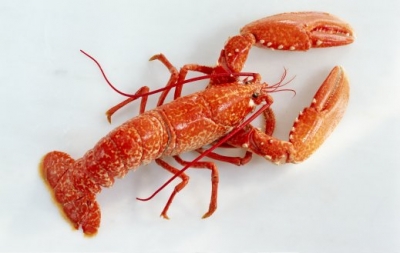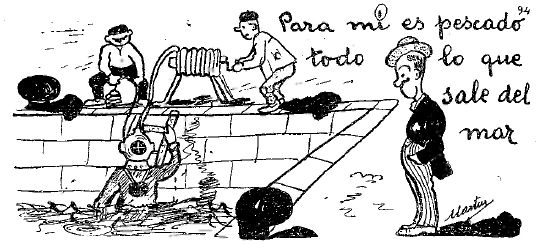
| Языки :: Испанский |
| Аудио |
 |
|
|
275 |
Español |
Spanish |
|
Lección Noventa y cuarto (94) |
||
| La langosta | The lobster. | |
| 1 |
Rafael. — Simone ¿está muy cara la langosta? Simone. — Carísima, Rafael (1). Es un pescado inabordable. |
Raphael. — Simone, is lobster very dear? — Simone. — Very dear, Raphael. It is a prohibitive fish. |
| 2 |
Raf. — La langosta no es un pescado, Simone. Porque tú, al decir pescado has querido decir en francés poisson, en castellano pez (2). |
Raph. — Lobster is not a fish, Sim. For, in saying " pescado ", you wanted to say " poisson " in French, in Castilian "pez". |
| 3 |
Sim. —- La langosta es un crustáceo; lo sé perfectamente. Pero para mí, en la mesa, es pescado todo lo que sale del mar. |
Sim. — Lobster is a crustacean, I know it perfectly. But, for me, on the table, all that comes out of the sea is fish, |
| 4 |
Raf. — Tienes razón, Simone. Pero aunque cueste tan cara como tú dices (3), pon alguna vez langosta (4). Estoy cansado de la merluza, del besugo, y del bonito. Créeme. |
You are right, S. But although it costs as dear as you say, give [put] me sometimes lobster. I am tired of hake, red mullet, and tunny. Believe me. |
| 5 |
Sim. — Bueno. Tendrás langosta y yo misma haré la mayonesa; pero hay una cosa que no me explico. Raf.—¿Cual? (5). |
S. — Good, you will have lobster and I myself shall make the mayonnaise.
But there's one thing that I can [do] not explain to myself. — R. — Which? |
| 6 |
Sim. — Que cueste tan cara en España la langosta. Raf — Mujer, lo mismo ocurre en Francia; la langosta es la reina de los mares. No me digas que en París pagas la langosta al precio del besugo. |
S. — That lobster is [costs] so dear in Spain. — R. — Dear friend [wife] the same thing happens in France, the lobster is the queen of the seas. Don't tell me that in Paris you pay lobster at the (same) price as [of] red mullet. |
| 7 |
Sim. — No en París, no. Lo reconozco. Pero en España no me explico que cueste tanto. La debían de dar de balde (6). |
S. — No, not in Paris. I acknowledge that. But in Spain I cannot explain that it should cost so much. They should give it for nothing. |
| 8 | Raf. — Tiene gracia (7). ¿Por qué? | R. — Joking aside... [it's funny] and why ? |
| 9 |
Sim. — Porque a cada rato leo en vuestros periódicos : « La plaga de la langosta, la plaga de la langosta... » (8). |
Because I read at every moment in your papers : " The plague of the ' langosta' "... |
| (This dialogue is an extract from Mademoiselle Simone in Madrid, a novel by Alberto Insúa.) | ||
| ( Mademoiselle Simone in Madrid, by Alberto Insúa.) | ||
| EJERCICIOS | EXERCISE : | |
| Platos de Pescado. | Fish dishes. | |
| 1 | ¿Qué pescado nos ponen hoy, María? | What fish do they give [put] us today, Mary? |
| 2 |
Pues como es día de vigilia, tenemos variedad y podrá
usted escoger: hay bacalao a la vizcaína, lenguado frito, anguilas a la marinera, bonito en escabeche y langosta a la vinagreta. |
Well, to-day, as it is a fast-day, we have variety, and you can choose : there is Biscayan cod, fried sole, eel stew, soused tunny and lobster with vinegar sauce. |
| 3 | ¿No hay truchas u otro pescado de río? | Are there no trout or (any) other river fish? |
| 4 |
Truchas, me parece que no, pero creo que el menú trae
sollo; mírelo usted por si acaso estoy equivocada. |
Trout, I don't think so, but I believe that the menu h0as [bears] pike;
look at it, in case I should be mistaken. |
| 5 |
Efectivamente lo hay, pero preferiría otro pescado, por
ejemplo salmón. — El salmón sólo lo tenemos en lata. |
In fact, there is some, but I should prefer another fish, for instance,
salmon. — Salmon we we have only tinned [in tin]. |
| 6 |
No, no nada de latas; ya que no lo hay fresco, tomaré
otra cosa : ¿a ver que tal resulta ese bacalao a la vizcaína? nunca lo probé. |
No, no not[hing of] tins; since there is no fresh one. I shall take
something else. Let us see [to see] how it is [results] this Biscayan cod; I have never tasted it. |
| 7 | Excelente idea, señor; al parecer está riquísimo. | Excellent idea, sir, it is, it seems, succulent. |
| 8 | Y cuando haya salmón fresco me avisará, ¿verdad? | And when there is (subj.) fresh salmon, you'll let me know, won't you? |
|
Riquísimo, superlative of rico, rich, for dishes or drinks, delicioas. |
| NOTES. | |
| 1 |
Carísima = muy cara. The formation of the superlative by the ending ísima is very current and popular. Don't forget to mark the stress on the first í. Note the spelling : largo, long; larguísimo, very long; feliz, happy; felicísimo, very happy. |
| 2 |
Let us remember that : pez means the living fish, in the water;
mudo como un pez, dumb as a fish; no me gusta el pescado, I don't like fish (as a dish); pescado is the fish when caught. |
| 3 |
Notice, cueste tan cara, with the adjective in the feminine
cara (dear), as if there was the verb estar : que esté tan cara, that it should be so dear. |
| 4 |
Pon, literally : put; the irregular sing. imperative of
poner. The regular form would be : pone. We know that with usted, we say : ponga usted, put. To express the idea of serving something at table, one often uses poner instead of servir; nos ponen merluzas todos los días : they serve us hake every day. — Poner la mesa, to lay the table; quitar la mesa, to clear the table. |
| 5 | ¿Cual?, plur. ¿cuales?, which? (See revision lesson n° 98). |
| 6 | Debían = deberían, should, ought to (less. 78, n. 5). |
| 7 | Tiene gracia, read again note 1 of less. 80, about "gracia". |
| 8 | Simone, who is, in fact, a Parisian, is excusable for not knowing that the Spanish word "langosta" means, as well lobster, a crustacean like the African locust, an insect that is a veritable plague (plaga) in the fields of Southern Spain. |
